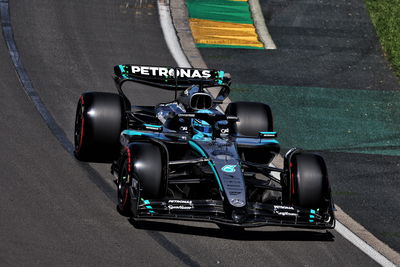Mercedes

Team Statistics

About Mercedes
Mercedes are one of F1’s most successful teams, with eight constructors’ titles and nine drivers’ titles.
Latest News
Team Information
Mercedes are one of F1’s most successful teams, with eight constructors’ titles and nine drivers’ titles.
Mercedes in 2025
2025 marks a new era for Mercedes as they compete without Lewis Hamilton for the first time since 2012. Instead, he has been replaced by 18-year-old wonderkid Andrea Kimi Antonelli, who teams up with George Russell.
Mercedes will likely have one eye on next year, with Toto Wolff and James Allison confident about their chances in 2026 under the new engine regulations. The team continues to show flashes of potential, but they struggle with consistency.
This has been the case over the last three years and is unlikely to change in 2025.
Mercedes’ F1 History
Mercedes’ F1 history stretches back to 1954 when they won the championship with Juan Manuel Fangio. The success continued into 1955, with Fangio adding another title to his trophy cabinet.
Despite their two title triumphs, Mercedes withdrew from motorsport following the 1955 Le Mans disaster, where 83 spectators tragically lost their lives. Mercedes returned in 1994 as an engine supplier, teaming up with the British engineering company Ilmor.
After a brief stint supplying Sauber, Mercedes joined forces with McLaren, embarking on a highly successful 20-year partnership. Mercedes later supplied engines to Brawn GP in 2009, assisting them in a fairytale championship win.
The decision to supply Brawn GP paved the way for Mercedes’ ultimate return as a works team. Brawn GP was rebranded as the Mercedes GP Petronas F1 Team, with Michael Schumacher and Nico Rosberg as their drivers.
Mercedes’ first three years back in F1 were largely unsuccessful, with just one victory at the 2012 Chinese Grand Prix. However, Mercedes had smartly turned their attention to the 2014 engine regulations, which became a catalyst for change.
Lewis Hamilton joined Mercedes from McLaren in 2013, and the team secured three victories that season. Their gamble to focus on the 2014 regulations proved crucial as they dominated the first year of the new rules.
Mercedes’ engine advantage made them untouchable in 2015 and 2016. Ferrari posed renewed threats in 2017 and 2018, but Mercedes' unbeaten run in both championships continued.
Between 2014 and 2018, Hamilton won four drivers’ titles, while Rosberg claimed one (in 2016) before retiring, paving the way for Williams driver Valtteri Bottas to join the team.
2019 and 2020 saw more dominance, with Mercedes no longer reliant solely on their powerful engine but also showcasing engineering genius with their chassis. The 2020 W11 is widely regarded as the fastest F1 car of all time, thanks to its unprecedented levels of downforce.
Mercedes were finally beaten - in the drivers’ championship, at least - in 2021, when Max Verstappen triumphed over Hamilton in a dramatic finale.
The ‘ground effect’ era, which began in 2022, seems to have halted Mercedes’ dominance, with only a handful of wins to their name since.